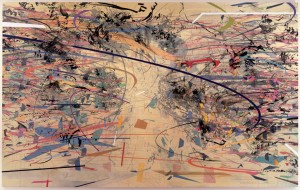
Julie Mehretu is one of the participants.
An example of her work (not in show). Courtesy Marian Goodman, New York.
Another Look at Detroit: Parts 1 and 2, curated by Todd Levin and in collaboration with Marlborough Chelsea
June 26 – August 8, 2014
509 West 24th Street
ANOTHER LOOK at DETROIT: PARTS 1 and 2
Curated by Todd Levin
June 26 – August 8, 2014 | Opening: Thursday, June 26, 6- 8pm
A joint project between Marianne Boesky Gallery and Marlborough Chelsea, Another Look at Detroit presents works and objects by over fifty artists, designers, and cultural contributors. The focus of this exhibition is the city of Detroit as a creative center, historically through to today. Spanning a period of 150 years, and taking place at both galleries’ Chelsea spaces, this exhibition is by no means a comprehensive survey. Rather, Another Look at Detroit intends to portray a vision as sprawling and complex as the biography of the city itself.
Mary Ann Aitken / Keith Aoki / William James Bennett / Harry Bertoia / McArthur Binion / James Lee Byars / Nick Cave / James Chatelain / Liz Cohen / Destroy All Monsters / Robert Duncanson/Charles and Ray Eames/ John Egner/ The Henry Ford/ Cyprien Gaillard / Michael Glancy / Brenda Goodman / Jay Heikes / Marie T. Hermann / Scott Hocking / Percy Ives / Ray Johnson / Mike Kelley / Arthur Nevill Kirk / Hughie Lee-Smith / Kate Levant / Morton Levin / Arnold Livshenko / Al Loving / Michael C. Luchs / P. Scott Makela / Tony Matelli / Katherine McCoy / Michael McCoy / Allie McGhee / Charles McGee / Julie Mehretu/ Julius Garibaldi Melchers / Metroplex / Ann Mikolowski / Carl Milles / Wallace MacMahon Mitchell / Gordon Newton / Michele Oka Doner / Max Ortiz / Ellen Phelan / Pewabic Pottery / Bill Rauhauser / Scott Reeder / Jennifer Wynne Reeves / Richard Ritter / Diego Rivera / Eero Saarinen / Eliel Saarinen / Loja Saarinen / Dana Schutz / Zoltan Sepheshy / Robert Sestok / Jim Shaw / Shinola / Michael E. Smith / Mortimer Smith / Gilda Snowden / John Mix Stanley / Anna Sui / Graem Whyte / Robert Wilson
For more information regarding works in the exhibition, please contact Aniko Berman at aniko@marianneboeskygallery.com or Amanda Schmitt at schmitt@marlboroughchelsea.com.
For press information, please contact Shayna McClelland at s@shaynamcclelland.com or Adam Abdalla at adam@nadinejohnson.com.
__
ANOTHER LOOK at DETROIT: PARTS 1 and 2
This is not an exhibition about geopolitics or macroeconomics or global finance. This is not an exhibition glorifying the misguided aesthetics of destruction porn. It is neither a feel-good exhibition trying to accentuate the positive, nor an attempt at organizing a proper historical overview of how a city was birthed and decayed.
This exhibition is a sprawling tone poem evoking the city where I was born and raised, a place I still feel deeply in my identity. A soliloquy by someone returning home, but not to the place they once knew.
Detroit was born in July 1701. In the 19th century, the city was the center of the nation’s carriage and wheel trade and stove industry. Henry Ford, a farmer, built his first automobile plant in Highland Park in 1899. General Motors was founded in 1908. A century later, on June 1, 2009, General Motors declared bankruptcy. This followed Chrysler, which had done so a month earlier. On July 18, 2013, Detroit filed for the largest municipal bankruptcy in the history of history.
Now, Detroit can no longer be ignored. Detroit has become epic, symbolic, historic – hip, even. Detroit is the birthplace of mass production, the automobile, the cement road, and credit on a mass scale. America’s way of life was built here. Now, it is the unemployment capital, where half the population does not work a consistent job. Detroit, which once led the nation in home ownership, is now a foreclosure capital. Once the nation’s richest large city, Detroit is now its poorest. Detroit, by some estimates, is 40% vacant.
Since its beginning, Detroit has been a place of perpetual flames, and not just the fires spewing forth from furnaces smelting iron transported directly to the River Rouge foundry, where it was poured into molds to make engine blocks. Three times the city has suffered race riots and three times the city has burned to the ground. The city’s flag acknowledges as much – Speramus Meliora; Resurget Cineribus – we hope for better things; it shall rise from the ashes.
People ask, “Where is the hope in Detroit?” This exhibition posits that some of that hope resides in Art. Not just Art itself, but those who create it, support it, critique it, curate it, exhibit it, and buy and sell it. There must be something that makes us want to continue. To believe in and support Art, in whatever manner our abilities allow, is to believe in that continuation.
We have believed in that kind of creativity. I know I still do. If I didn’t, why would I be bothering to curate such an exhibition? Certainly not to sit here and make a public announcement of the Apocalypse.
To share one’s critical feelings about the past, to try to describe and assess the present – all that implies a firm belief in a future.
Speramus Meliora; Resurget Cineribus.
-Todd Levin, 2014
__
Marianne Boesky Gallery and Marlborough Chelsea would like to express their gratitude to the many individuals and institutions whose generous loans made this exhibition possible, including Cranbrook Academy of Art, Detroit Historical Society, Detroit Institute of Arts, The Henry Ford Museum, Mike Kelley Foundation for the Arts, New York Historical Society, Pewabic Society, and Wayne State University.
We also extend a special thanks to Dora Apel, Jonathan Boos, Elysia Borowy-Reeder, Bridget Finn, Rebecca Ruth Hart, Joseph Ketner, Cary Loren, Laura Mott, George N’Namdi, and Michelle Smith for their support and expertise.
